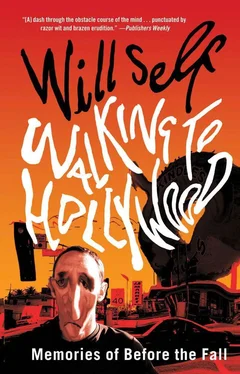Will Self - Walking to Hollywood
Здесь есть возможность читать онлайн «Will Self - Walking to Hollywood» весь текст электронной книги совершенно бесплатно (целиком полную версию без сокращений). В некоторых случаях можно слушать аудио, скачать через торрент в формате fb2 и присутствует краткое содержание. Год выпуска: 2011, Издательство: Grove/Atlantic, Inc., Жанр: Современная проза, на английском языке. Описание произведения, (предисловие) а так же отзывы посетителей доступны на портале библиотеки ЛибКат.
- Название:Walking to Hollywood
- Автор:
- Издательство:Grove/Atlantic, Inc.
- Жанр:
- Год:2011
- ISBN:нет данных
- Рейтинг книги:4 / 5. Голосов: 1
-
Избранное:Добавить в избранное
- Отзывы:
-
Ваша оценка:
- 80
- 1
- 2
- 3
- 4
- 5
Walking to Hollywood: краткое содержание, описание и аннотация
Предлагаем к чтению аннотацию, описание, краткое содержание или предисловие (зависит от того, что написал сам автор книги «Walking to Hollywood»). Если вы не нашли необходимую информацию о книге — напишите в комментариях, мы постараемся отыскать её.
Walking to Hollywood — читать онлайн бесплатно полную книгу (весь текст) целиком
Ниже представлен текст книги, разбитый по страницам. Система сохранения места последней прочитанной страницы, позволяет с удобством читать онлайн бесплатно книгу «Walking to Hollywood», без необходимости каждый раз заново искать на чём Вы остановились. Поставьте закладку, и сможете в любой момент перейти на страницу, на которой закончили чтение.
Интервал:
Закладка:
I couldn’t assess the Tiffins’ performance, because they were mostly silent, absorbed in the spectacle of François and Marianne’s pantomimic co-dependency. As for Yann Perreau, I couldn’t remember what he’d looked like at all, and, true to my agnosia, the filmmakers equipped his actor with a mask of featureless flesh.
The sound was as good as the camerawork, so that as I zoomed in the clatter of cutlery and the kvetching of François and Marianne became muffled, while Jonathan’s gently emphatic voice increased in clarity; he was saying to the man sitting beside him: ‘Yes, I know what you mean. I sat on the jury at last year’s Edinburgh Film Festival, and of the ten films we shortlisted for the Best British category not one got a theatrical release; they all went — if they went anywhere at all — straight to video.’
‘Mm, mm,’ affirmed the man playing me — he was chewing some bread. ‘It just goes to prove my point: film is dead, its century-long reign as king of narrative has ended, and we are in an interregnum, and, as Gramsci observed of such periods between political hegemonies — now the strangest freaks and sports will arise.’
I was disappointed, obviously, that my part hadn’t attracted a leading man, although there are worse fates than to be played by a classy British character actor. I couldn’t fault me on my mannerisms: the deep-sea waggle of the hammerhead, the lazy flap of the cartilaginous hands; the voice, too, was spot-on: nasally posh, whiningly mockney. But was this David Thewlis (too young, too good-looking) or Pete Postlethwaite (too old, too ugly), whose head, together with that of the Coe-alike, filled the screen as I closed on them?
No matter, because just as it seemed my POV was going to perform a laparoscopy on the mystery thespian, it reared back with the suddenness of a striking rattlesnake, swivelled right round, then tracked through the bistro and out the door. It paused for three seconds to capture a statue of Goudouli: the celebrated Occitan poet sat foppishly atop a rockery planted with swooning nudes, a pigeon perching on his wrist — was he was hawking for bread?
SIX MONTHS LATER annulled Goudouli’s stonily good-humoured features, and then this establishing shot — that ought, by rights, to have preceded the bistro scene — dissolved into smoky limbo. During this interlude I envisioned the opening of John Huston’s Moulin Rouge (1952), wherein Toulouse-Lautrec climbs down from his Montmartre bar stool, and, as he stumps towards the door, le patron peers over the zinc rampart and says, ‘So long, Toulouse.’ But of course in my version the painter of restricted height wasn’t played by José Ferrer but Sherman Oaks, and as he came on he winked at me, horribly, a crack in a face crusted with coagulated blood.
SIX MONTHS LATER
Exterior, night: the terrace of the Café Pinot beside the Los Angeles Public Library, a blowy evening in October 2007. The wind rattles the sunshades and the aurora urbanis streams in plumes of orangey light from the glassy cliffs of the surrounding skyscrapers. As my severed head is bowled through the double doors and past the giant rotisserie that’s the café’s selling point, it’s difficult to accept that this was a scene completely excised from my memory of the time I had spent in Los Angeles — for I know what’s coming: a long dining room of Bauhausian rationality, the windows outlined in black like Mondrian rectangles, below them a continuous banquette, in front of this white-clothed tables for two, mostly empty, but at one sits Ellen DeGeneres, playing the part of Stevie Rosenbloom, my Hollywood agent, while opposite her is… yes, David Thewlis.
His behaviour in Toronto now makes sense. At the time I’d assumed he was simply cutting me, sensing that I — like, no doubt, others he met — believed he gave his finest performance in Mike Leigh’s Naked (1993), and that since then, like so many actors who have been hollowed out by the director’s compulsive improvisatory method, he had been coasting. Actors, humph! They’re like that — even the best of them are passive, receptive… can I get away with feminized? Waiting for the back of a hand to prink their rouged nipples, waiting for it to slide down into the dry cleft of their pride, moisten it — so that it swells.
From the bar between two rusty lamp-posts hangs the carcass of a newly slaughtered ox. Standing in a cloud of flies, a man with a knife is cleaning out the entrails. Huxley stands tripping in Schwab’s on La Cienega — and then again on the beach at Santa Monica with Thomas Mann. Partially sighted as he is, Huxley still notes that their leather-shod feet are dabbling in the slurry of used condoms expelled from a sewer outfall .
The freshly slaughtered beef forms a ridge of erect slices on my flat white plate; to one side there’s a rick of grated carrot and celeriac; to the other there’s a boulder of potato mashed with sage. Thewlis looks balefully at this, then away to where a waiter, wound into his apron as tightly as a plague victim into a shroud, stands forlorn beside a pillar.
‘We hear a lot about tortured genius,’ says Thewlis-as-me, ‘but what about tortured mediocrity?’
The waiter takes this personally and huffs off towards the giant rotisserie.
‘Now you’ve offended him,’ says DeGeneres-as-Stevie. I zoom in on her: she’s eating fish — a newly landed rainbow trout that arches on her plate, flipping beads of water across her brownish dress. There’s something going on at the neck of this garment, but such are the vagaries of my memory that what may have been silk ruffles have been replaced by the small squares of opacity used to obscure the faces of covertly filmed criminal suspects.
‘I don’t give a shit,’ Thewlis/Self comes back. ‘If he’s exercised about his craft he should go out on strike with the rest of ’em.’
‘What about you?’ DeGeneres I thought a casting against type, but she’s got Stevie’s gentle Angeleno rasp down pat. ‘I mean, doncha think you should come out in support of the screenwriters; after all you’re in an allied trade?’
‘Right! But what would my picket line be like? I mean, am I gonna stop myself getting to my own typewriter, or will I show up once a year to prevent myself mailing a manuscript to the publisher?’
‘I getcha — and y’know, there’s gonna be no real solution to this: the generals on both sides are fighting the last war, the dispute back in the eighties when the writers lost out on the revenue from video rentals. No one really knows what’s at stake now — if anything at all: these guys are going head to head over what they think the internet residuals from Dharma & Greg might be worth.’
Thewlis has felled one of the beef slices and managed a few bites, together with a scrape of potato, but he’s obviously not interested and lets his cutlery clatter into the shattered food, ruining something that had the compositional integrity of a seventeenth-century Dutch vanitas painting. He takes a swig of Powerade from a handy bottle. He looks DeGeneres in the eye: ‘It’s significant, isn’t it, that you talk of TV rather than the movies.’
‘Well, that’s where the money is — such as it is. I mean, there’s an avalanche of product now — most of the WGA people are network TV writers who’ll never work again.’
Thewlis doesn’t seem to hear this, but presses on: ‘And it can’t’ve escaped your notice that this is the first year ever that video-game sales are set to surpass movie receipts?’
‘No, no, it hasn’t escaped my notice.’ DeGeneres casts her blue eyes (a blooper, Stevie’s are hazel) down to her plate: the trout is dead.
‘Has it occurred to you, Stevie, that this is it?’ Such sententiousness! Can that really be what I’m like? ‘This is the death of the movies — the shattering of the century-old mirror within which humanity has regarded its own plug-ugly features—’ Thewlis is interrupted by the waiter, who has sidled back to remove DeGeneres’s dead fish, and is raising a brow at my mad cow platter. ‘I haven’t finished yet!’ Thewlis cries, attacking the mash with his fork so that white worms writhe through its tines.
Читать дальшеИнтервал:
Закладка:
Похожие книги на «Walking to Hollywood»
Представляем Вашему вниманию похожие книги на «Walking to Hollywood» списком для выбора. Мы отобрали схожую по названию и смыслу литературу в надежде предоставить читателям больше вариантов отыскать новые, интересные, ещё непрочитанные произведения.
Обсуждение, отзывы о книге «Walking to Hollywood» и просто собственные мнения читателей. Оставьте ваши комментарии, напишите, что Вы думаете о произведении, его смысле или главных героях. Укажите что конкретно понравилось, а что нет, и почему Вы так считаете.












